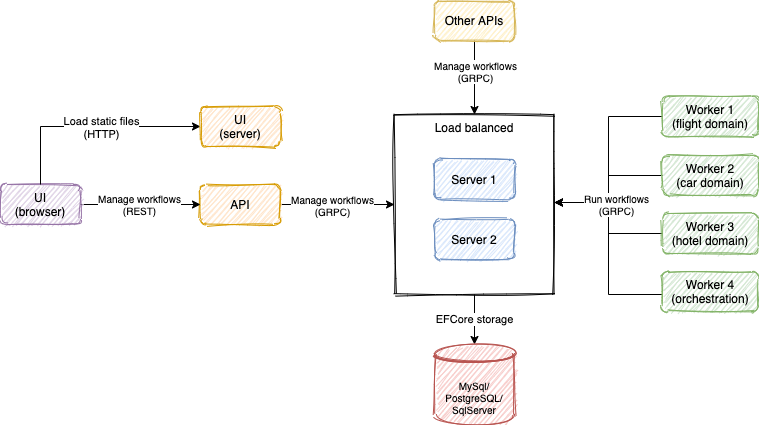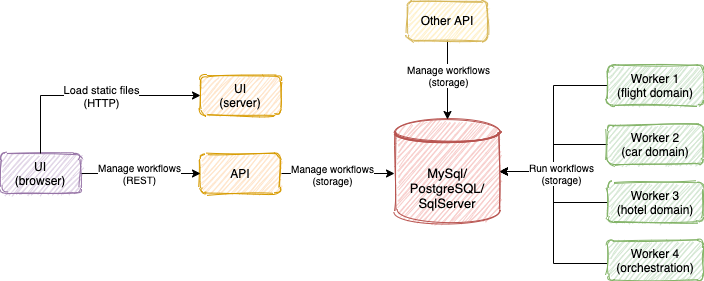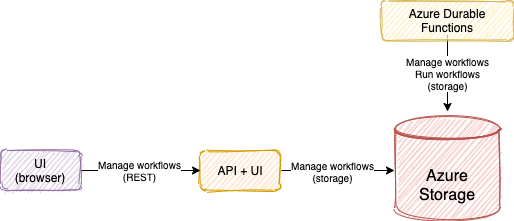Durable Task Extensions 

NOTE: WORK IN PROGRESS, NOT PRODUCTION READY.
Introduction
This project aims to extend Durable Task Framework with more features and make it easier to use.
Scope:
- More interfaces defining storage features
- Dependency injection integration
- EF Core MySql/PostgreSQL/SqlServer storages
- Distributed workers: Allows splitting orchestrations/activities implementation in multiple workers
- Indirect storage access via GRPC protocol: Centralize your storage choice and configuration in a single component.
- UI
- BPMN runner (not sure yet)
Motivation
Durable Task Framework is an open source framework that provides a foundation for workflow as code in .NET platform.
Azure Durable Functions connects Durable Task Framework to Azure serverless platform, making it simpler to create workflows as code.
The concepts of Durable Functions led to the development of Cadence. A platform that brings Durable Functions to other programming languages and extends it with concepts for better microservices orchestration, like tasks lists and distributed workers.
Because of the bad integration of Cadence with .NET platform, I decided to try to add to Durable Task Framework the features I like from Cadence.
NOTE: Cadence was recently forked by one of it's creators and Temporal was created, backed by a company focused on evolving the platform. That might change this landscape in a short term.
Components
LLL.DurableTask.Core 
Extends Durable Task Core with more interfaces and features:
- IExtendedOrchestrationService:
- Lock and execute specific orchestrations
- Lock and execute specific activities
- IExtendedOrchestrationServiceClient:
- Search orchestrations
- Purge orchestration instance history
LLL.DurableTask.AzureStorage 
Extends Durable Task Azure storage with:
- Dependency Injection
- Adapter implementing IExtendedOrchestrationServiceClient interface
Supported features
- UI: yes
- Distributed workers: no
- Storing activity input: no
- Failures rewind: yes
- Tags: no
- State per execution: no
Configuration
services.AddDurableTaskAzureStorage(options =>
{
options.TaskHubName = "Test";
options.StorageConnectionString = "UseDevelopmentStorage=true";
});LLL.DurableTask.Emulator 
Extends Durable Task Emulator storage with:
- Dependency Injection
Supported features
- UI: no
- Distributed workers: no
- Storing activity input: no
- Failures rewind: no
- Tags: no
- State per execution: no
Configuration
services.AddDurableTaskEmulatorStorage();LLL.DurableTask.EFCore 
Implements relational relational database storage using EFCore.
The implementation uses a combination of row locking, skip locked and polling to implement queues.
Supported features
- UI: yes
- Distributed workers: yes
- Storing activity input: yes
- Failures rewind: yes
- Tags: yes
- State per execution: yes
LLL.DurableTask.EFCore.InMemory 
Extension to EFCore storage with queries specific to InMemory database.
Configuration
services.AddDurableTaskEFCoreStorage()
.UseInMemoryDatabase("DatabaseName");LLL.DurableTask.EFCore.MySql 
Extension to EFCore storage with migrations and queries specific to MySql.
Configuration
services.AddDurableTaskEFCoreStorage()
.UseMySql("YOUR_CONNECTION_STRING");LLL.DurableTask.EFCore.PostgreSQL 
Extension to EFCore storage with migrations and queries specific to PostgreSQL.
Configuration
services.AddDurableTaskEFCoreStorage()
.UseNpgsql("YOUR_CONNECTION_STRING");LLL.DurableTask.EFCore.SqlServer 
Extension to EFCore storage with migrations and queries specific to Sql Server.
Configuration
services.AddDurableTaskEFCoreStorage()
.UseSqlServer("YOUR_CONNECTION_STRING");LLL.DurableTask.Client 
Dependency injection extensions to configure TaskHubClient.
Allows management of orchestrations via code.
Depends on
- Storage
Configuration
services.AddDurableTaskClient();Usage
public IActionResult BookPackage([FromService] TaskHubClient taskHubClient) {
await taskHubClient.CreateOrchestrationInstanceAsync("BookParallel", "v1", new {
bookFlight: true,
bookHotel: true,
bookCar: true
});
...
}LLL.DurableTask.Worker 
Dependency injection extensions to configure TaskHubWorker.
Allows execution of orchestration/activity tasks.
A service scope is created for each orchestration and activity execution.
Orchestrations/activities/middlewares supports dependency injection.
Depends on
- Storage
Configuration
services.AddDurableTaskWorker(builder =>
{
// Add orchestration with default name and version
builder.AddOrchestration<BookParallel>();
// Add orchestration with specific name and version
builder.AddOrchestration<BookParallel>("BookParallel", "v1");
// Add activity with default name and version
builder.AddActivity<BookHotelActivity>();
// Add activity with specific name and version
builder.AddActivity<BookHotelActivity>("BookHotel", "v1");
});Or you can also scan an assembly to add all orchestrations and/or activities marked with attributes OrchestrationAttribute or ActivityAttribute:
services.AddDurableTaskWorker(builder =>
{
// Adds all orchestrations and activities from assembly
builder.AddFromAssembly(typeof(Startup).Assembly);
// Add only orchestrations from assembly
builder.AddOrchestrationsFromAssembly(typeof(Startup).Assembly);
// Add only activities from assembly
builder.AddActivitiesFromAssembly(typeof(Startup).Assembly);
});NOTE: When using storages that doesn't support distributed workers, make sure all your orchestrations and activities are implemented in the same worker and add the following lines to your worker configuration:
services.AddDurableTaskWorker(builder =>
{
...
builder.HasAllOrchestrations = true;
builder.HasAllActivities = true;
});LLL.DurableTask.Server 
Expose any storage implementation as API.
Allow microservices to connect to an API instead of directly to storage.
Depends on
- Storage
LLL.DurableTask.Server.Grpc 
GRPC endpoints for server.
The chatty orchestration execution communication is done with bidirectional streaming, maintaining the orchestration session alive in the server side.
Activity execution and all remaining communication is done with non streamed rpc.
Configuration
services.AddDurableTaskServer(builder =>
{
builder.AddGrpcEndpoints();
});
...
app.UseEndpoints(endpoints =>
{
endpoints.MapDurableTaskServerGrpcService();
});LLL.DurableTask.Server.Grpc.Client 
Durable Task storage implementation using server GRPC endpoints.
Supports same features as the storage configured in the server.
Configuration
services.AddDurableTaskServerGrpcStorage(options =>
{
options.BaseAddress = new Uri("YOUR_SERVER_ADDRESS");
});LLL.DurableTask.Api 
Exposes orchestration management operations in a REST API.
Depends on
- Storage
- Client
Configuration
// Add Durable Task Api services
services.AddDurableTaskApi();
...
app.UseEndpoints(endpoints =>
{
// Map Durable Task Api endpoints under /api prefix
// Example of endpoint path: /api/v1/orchestrations
endpoints.MapDurableTaskApi();
});Alternatively you can define your own prefix:
app.UseEndpoints(endpoints =>
{
// Map Durable Task Api endpoints under /tasks-api prefix
// Example of endpoint path: /tasks-api/v1/orchestrations
endpoints.MapDurableTaskApi("/tasks-api");
});The API is integrated by default with ASP.NET Core Authorization Policies. You must configure all Durable task policies and their requirements, like the example below:
services.AddAuthorization(c =>
{
c.AddPolicy(DurableTaskPolicy.Entrypoint, p => p.RequireAssertion(x => true));
c.AddPolicy(DurableTaskPolicy.Read, p => p.RequireRole("Reader"));
c.AddPolicy(DurableTaskPolicy.ReadHistory, p => p.RequireRole("Reader"));
c.AddPolicy(DurableTaskPolicy.Create, p => p.RequireRole("Administrator"));
c.AddPolicy(DurableTaskPolicy.Terminate, p => p.RequireRole("Administrator"));
c.AddPolicy(DurableTaskPolicy.RaiseEvent, p => p.RequireRole("Administrator"));
c.AddPolicy(DurableTaskPolicy.Purge, p => p.RequireRole("Administrator"));
});Alternatively, you can disable authorization integration on non production environments:
services.AddDurableTaskApi(options =>
{
options.DisableAuthorization = true;
});Cross-Origin Requests (CORS)
CORS configuration is required if you run Durable Task API and Durable Task UI from different domains.
To configure CORS, please follow Enable Cross-Origin Requests (CORS) in ASP.NET Core .
Durable Task API requires http methods: GET, POST, DELETE.
LLL.DurableTask.Ui 
Beautifull UI to manage orchestrations built with React + Material UI.
Take a look in the screenshots. History visualization is my favorite :-)
Configuration
services.AddDurableTaskUi(options =>
{
// Configure Durable Task UI
});
...
// Serve Durable Task Ui files under root path
app.UseDurableTaskUi();Alternatively, you can define a path to serve the Ui from:
// Serve Durable Task Ui files under path /tasks
app.UseDurableTaskUi("/tasks");You can configure Durable Task Ui with the following options:
| Option | Default value | Description |
|---|---|---|
| ApiBaseUrl | "/api" | The base url of Durable Task Api |
| UserNameClaims | "preferred_username", "name", "sub" | Prioritized claims used to refer to the logged in user |
| Oidc | null | Object with OIDC integration configuration. OIDC is disabled when null |
OIDC/OAuth2 integration
You can enable OIDC integration by configuring OIDC options:
| Option | Default value | Description |
|---|---|---|
| Authority | null | The URL of the OIDC/OAuth2 provider |
| ClientId | null | Your client application's identifier as registered with the OIDC/OAuth2 provider |
| ResponseType | "id_token" | The type of response desired from the OIDC/OAuth2 provider |
| Scope | "openid" | The scope being requested from the OIDC/OAuth2 provider |
| Prompt | null | Information sent to IDP during OIDC authorization |
| Display | null | Information sent to IDP during OIDC authorization |
| LoadUserInfo | null | Flag to control if additional identity data is loaded from the user info endpoint in order to populate the user's profile. |
The redirect_url and post_logout_redirect_uri values are computed automatically from the url used to access Durable Task Ui. You should configure both redirect urls on your OIDC server with the same url you use to access Durable Task Ui.
Compose components to build your own architecture
Microservices with server
Microservices with direct storage connection
Single service
UI for Durable Functions
Build requirements
- .NET 5 SDK
- .NET 3.1 Runtime
Sample
Inside the sample folder you will find an implementation of the classic book Flight, Car, Hotel with compensation problem.
The sample was built to demonstrate a microservices architecture with the following components:
- Server: Connects to storage and exposes it as GRPC endpoints.
- Api: Exposes REST API to manage orchestrations.
- UI: Exposes UI to manage orchestrations.
- OrchestrationWorker: Implements BookParallel and BookSquential orchestrations for the given problem.
- FlightWorker: Implements BookFlight and CancelFlight activities.
- CarWorker: Implements BookCar and CancelCar activities.
- HotelWorker: Implements BookHotel and CancelHotel activities.
- BPMNWorker: An experimental BPMN runner built on top of Durable Tasks. There are also BookParallel and BookSequential BPMN workflows for the given problem.
Runinng the sample
- Configure a EFCore storage at the server
- Simultaneously run all the projects listed above
- Open the UI at https://localhost:5002/
- Create the following test orchestrations and watch them be executed
Name Version InstanceId Input BookParallel v1 (Empty) (Empty) BookSequential v1 (Empty) (Empty) BPMN (Empty) (Empty) { "name": "BookParallel" } BPMN (Empty) (Empty) { "name": "BookSequential" } BPMN (Empty) (Empty) { "name": "Bonus" }


















